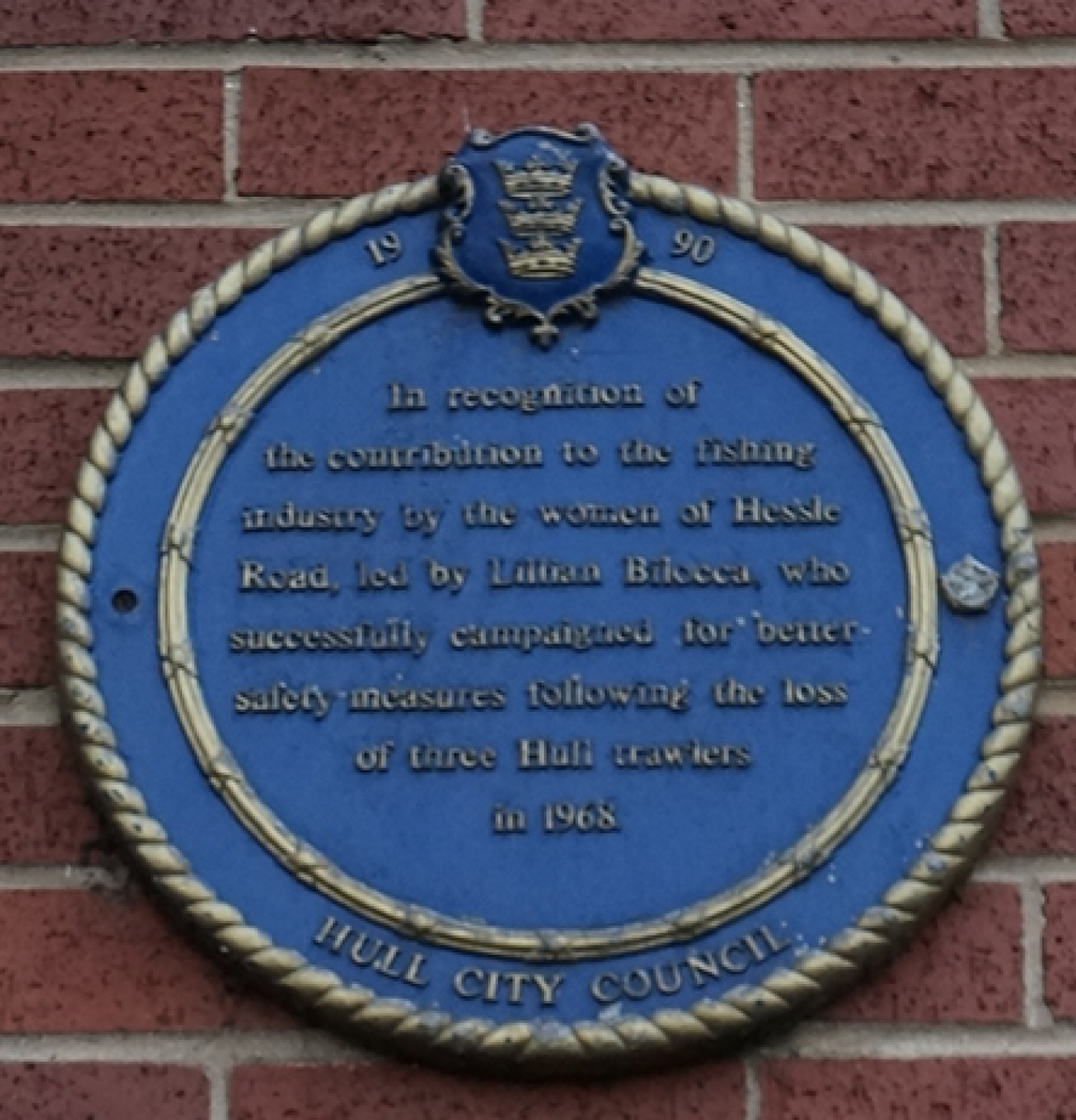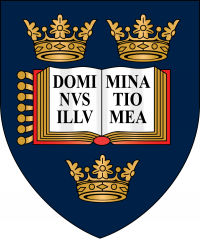In the early hours on 10 January 1968, the trawler St Romanus departed from St Andrew’s Dock in Hull on the way to the fishing grounds. The boat and its crew would never be seen again. The loss was the first of three trawlers that sank in only a short span of time. Fifty-eight men lost their lives, devastating the Hessle Road fishing community in Hull. The loss galvanised four local women in the community to propose a number of safety improvements, detailed in a petition, signed by 10,000, which they delivered to parliament. Yvonne Blenkinsop, Mary Denness, Christine Smallbone, and their leader Lillian Bilocca, sparked rapid safety reforms for trawlermen, an action that led the historian Dr Brain W Lavery to dub them the ‘Headscarf Revolutionaries’, after the distinctive headscarves many wore at the time.
Before change, however, there was tragedy. The ‘triple trawler disaster’, as it became known, consisted of the sinking of three Hull trawlers over the span of three weeks in 1968. The first, mentioned above, was the St Romanus. This boat departed from Hull on 10 January 1968. Staffed by a relatively young, inexperienced crew - the regular crew had taken time off to enjoy the Christmas period - St Romanus also had its skipper doubling as radio operator, rendering it effectively without radio contact in an emergency. The crew failed to check in via radio on 11 January after rough weather, but this raised no alarms, as calling in was not mandatory. It was only when the boat failed to turn up a fortnight later that the community began to realise the loss of the boat and its crew. Just then, on 27 January, a second trawler sank with all hands in similar circumstances: the Kingston Peridot. Now, 40 1 husbands, brothers, fathers, and sons were dead.
Why was there no protest by the fishermen? Some did. On 3 February, the news reported crews walking off St Romanus’ sister ship, St Andronicus, feeling their lifejackets were ‘archaic’ 2. However, many felt they could not protest. Their bosses could easily replace them with men who were happy to work under any conditions 3. It had to be someone else to take action.
For fish factory worker, Lillian Bilocca, two losses was enough to galvanise her. She drew up and presented her so-called Fisherman’s Charter, which made the following demands: a dedicated radio operator onboard every ship, better distress signalling, more training for crews, an end to fishing in bad weather, a support vessel to provide medical aid or rescue and that trawler owners look into preventing ice build-up on boats - a known hazard responsible for overturning many vessels 4. Bilocca also began to inspect trawlers going out of St Andrews dock, asking them if they had enough equipment and a radio operator. If they answered in the negative, she would attempt to throw herself on to the trawler. Images of her being tackled by police to prevent this made national news.
Bilocca, alongside Yvonne Blenkinsop, Mary Denness, and Christine Smallbone, tried to meet with trawler owners, but were not taken seriously. Undeterred, they went higher, planning to deliver their demands to parliament.
Just then, Hull got the news of the third sunk vessel that would make up the triple trawler disaster: the Ross Cleveland had turned over in bad weather off the coast of Iceland on 5 February. The total loss of men from the community was now 58. Only a single survivor of Ross Cleveland made it home by pure luck. To make it worse, Smallbone’s brother was Ross Cleveland’s skipper. Bilocca’s son Ernie came perilously close to meeting the same fate in the same storm. The fight had become much more urgent.
The next day, three of the four women set off for London. Smallbone stayed home to mourn her loss. They were received by a minister from the Board of Trade and one from the Ministry of Agriculture and Fisheries. To their joy, Bilocca, Blenkinsop, and Denness found the government sympathetic to their cause and agreed to all the demands presented in their Charter. Later addressing the House of Commons, the shipping minister remarked that ‘Lil’ and her army had done in seven days what unions and MPs could not do in years 5. It was a triumph. Within a few weeks,a support ship was launched to oversee the fishing fleet.
When the women returned home, their achievements, while celebrated, were not without backlash. Men were angry at the women for interfering in ‘men’s business’, with Blenkinsop even being punched in a restaurant 6. Bilocca, being the face of the movement, received malicious letters and death threats. She also drew the ire of her community for her brash, straight-talking attitude, which many felt made them look bad to the media and by extension, the rest of the country. The backlash was at its worst when Icelanders landed cod in Hull while local fishermen were banned from going out due to bad weather 7. Skippers were enraged, feeling the government did not understand their needs. Though Bilocca won her war, it came at great personal cost, including the loss of her old job at the fish factory, which she suspected was a retaliatory firing. She was alienated from her community. Bilocca and her headscarf revolutionaries faded into obscurity.
Her work, however, was not in vain. The government stayed true to their promises, forcing trawler owners to implement the safety measures, and launching the Committee of Inquiry into Trawler Safety. Its report, published in 1969, committed to recommending the demands of the Fisherman’s Charter, making the support ship permanent, better vessel construction to enhance stability, and better conditions for crews 8. For a few years, fishermen’s safety was improved. Bilocca’s reforms, such as a radio operator on board, saved lives 9. However, with the collapse of the industry in the 1970s, due to the ‘Cod Wars’ and fishing stock depletion, the Hull fishermen faced new woes.
As for the women? After being shut out from the fishing industry, Bilocca worked odd jobs until she died from cancer in 1988. Smallbone followed her, dying in 2001. It was only after extensive work by historian Dr Brian Lavery to bring their story to light did they get the recognition they deserve in their native Hull. Benches dedicated to the four were unveiled in 2015 at a ceremony attended by Denness and Blenkinsop 10. Blenkinsop gained Honorary Freedom of the City from Hull in 2018 11. A blue plaque was also unveiled in Bilocca’s house in 2022 12. There have also been many informal tributes in the city, such as murals. Though all four of the women are now gone, with Blenkinsop being the last to die in 2022, they lived to gain the recognition they deserve, and the gratitude from the community for the safety measures that no doubt saved countless lives. Hull now is clearly proud of its revolutionary daughters.

Blue plaque dedicated to Lillian Bilocca in Hull.
Original photographer Ian S, licensed under Creative Commons.
Footnotes
-
1
“Hull trawler tragedy 50th anniversary marked with service.” BBC News, BBC, 4 March 2018, www.bbc.co.uk/news/uk-england-humber-43278826.
-
2
“Crew refuse to sail - protest over lifejackets.” Daily Mail, 3 February 1968, pp. 1.
-
3
Lavery, Brian. The Headscarf Revolutionaries: Lillian Bilocca and the Hull Triple-Trawler Disaster of 1968. Barbican Press, 2015. p.29
-
4
Lavery, Brian. The Headscarf Revolutionaries, p.82
-
5
Gibbons, Trevor. “Triple trawler tragedy: The Hull fishermen who never came home.” BBC News, 4 February 2018, www.bbc.co.uk/news/uk-england-humber-42253251. Accessed 17 Mar. 2024.
-
6
Campbell, James. “Yvonne Blenkinsop, Hull Headscarf Revolutionary, dies aged 83.” Hull Live, 24 April 2022, www.hulldailymail.co.uk/news/hull-east-yorkshire-news/yvonne-blenkinsop-hull-headscarf-revolutionary-6991512.
-
7
Lavery, The Headscarf Revolutionaries, p.136.
-
8
HC Deb 23 July 1969, vol 787, cols 1725-27.
-
9
Kemp, Dan. “‘Big Lil’ Saved my life and that’s why she should be named the Greatest Hullensian of all time.” Hull Live, 7 February 2021, www.hulldailymail.co.uk/news/hull-east-yorkshire-news/big-lil-saved-life-thats-4968171.
-
10
“Hundreds honour Hull women trawler safety fighters.” BBC News, BBC, 6 June 2015, www.bbc.co.uk/news/uk-england-humber-33034608.
-
11
“The last of the ‘Headscarf Revolutionaries’ is getting Hull Council’s highest honour.” Yorkshire Post, 28 September 2018, www.yorkshirepost.co.uk/news/the-last-of-the-headscarf-revolutionaries-is-getting-hull-councils-highest-honour-571425.
-
12
“Lillian Bilocca: Plaque for woman who revolutionised safety at sea.” BBC News, BBC, 22 January 2022, www.bbc.com/news/uk-england-humber-60069239.




